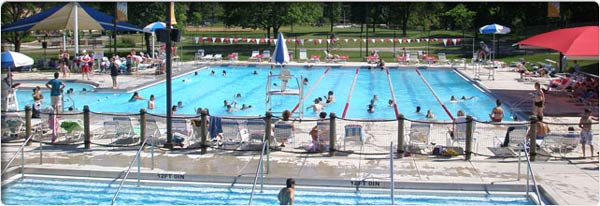 New Solution for End-of-Season Pool Safety
New Solution for End-of-Season Pool SafetyAs summer ends, most PDRMA members with aquatic facilities face a common challenge in pool safety; lifeguards leave before the end of the season. But Bloomingdale and Roselle Park Districts have found an answer. These neighboring agencies decided to keep just one aquatic facility open as the season wanes. By alternating each year, they “pool” their lifeguards and allow patrons of the neighboring facility that closes early to pay resident rates at the open facility.
In 2012, Carrie A. Fullerton, CPRE, Executive Director, Bloomingdale Park District and Robert Ward, Executive Director, Roselle Park District discussed their respective lifeguarding issues. “Carrie and I talked about year-end employment and the fact that our boundaries are very intermingled,” explains Ward. “A reciprocal arrangement could save nearly $10,000 with little to no effect on customer satisfaction. Besides that, we discovered we use the same guarding program, which makes it easier to move staff from facility to facility. As the season ends, attendance at both facilities decreases, so having two facilities open is unnecessary, based upon customer demand.”
 The arrangement offers other benefits beyond a fully staffed pool open until the end of the season. There’s more time for post-season maintenance, especially for large projects like painting a pool. Lifeguards like it because they are guaranteed work — and a paycheck — over a longer period as part of a full pool staff. The arrangement offers other benefits beyond a fully staffed pool open until the end of the season. There’s more time for post-season maintenance, especially for large projects like painting a pool. Lifeguards like it because they are guaranteed work — and a paycheck — over a longer period as part of a full pool staff.
Both executive directors note that the support of their boards, community and staff was vital. “Initially, the community wasn’t thrilled,” remembers Fullerton, “but after several years and detailed staff explanations, it is well accepted. We did have some challenges with pricing, which we worked collaboratively to address.”
Fellow PDRMA members should be prepared to negotiate to get the necessary support for such an arrangement. “This solution might not work if there is consternation on a board or if a community doesn’t think it’s of equal value to all concerned,” Ward cautions.
“If you do not have community, board and staff support, implementing a change like this can be a challenge,” adds Fullerton. “Most importantly, if your community is very guarded about using its own facility, this may not work at all. Mutual respect for your colleague and his aquatic operation and community needs is critical. Fairness and equity are also of the utmost importance. We’re flexible with each other should one agency need to complete a major capital project.”
“All in all, it’s been a positive arrangement for all parties,” says Ward. “Carrie and I have a good working relationship, which makes the implementation quite simple.”
“We do have an excellent working relationship,” agrees Fullerton, “and we both work for very fiscally responsible boards. We trust the Roselle Park District staff and board to work collaboratively with us in the best interest of both communities. Communication is critical for this kind of change.” Both executive directors took every opportunity to share information on the new policy — summer brochures, website, social media, front desk staff and marketing materials.
Whether your agency has an arrangement to address end-of-season staffing challenges or faces the challenge of keeping its aquatic facilities safe without neighboring help, PDRMA provides resources to help you finish the season with an eye on safety.

PDRMA Resources:
|

